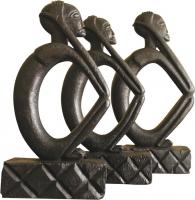 Kundi had succeeded Iala Maku, and now he was getting old. Harmony among the peoples of Lunda was getting strained. Who would succeed the old man Kundi? One of the boys? Tchinguri or Tchinhama? Or the girl, Lwéji, the youngest daughter of his second wife? They say the brothers could not get on together. Tchinguri was more dashing, Tchinhama more thoughtful. However that may be, one day the boys burst into their father's tchota (palace), drunk as lords on palm wine and went for the old man because both of them wanted to take over. The old man was half blind and dying, but he cursed them and told them there and then that neither of them would take his place. He called the macotas (the elders) and said he was handing over to Lwéji, the boys' half-sister. And so the Muatyânvua empire started in heh village of Mussumba, with the marriage of Lwéji, the new Lunda queen, to the Baluba hunter Tchibinda Ilunga.
Kundi had succeeded Iala Maku, and now he was getting old. Harmony among the peoples of Lunda was getting strained. Who would succeed the old man Kundi? One of the boys? Tchinguri or Tchinhama? Or the girl, Lwéji, the youngest daughter of his second wife? They say the brothers could not get on together. Tchinguri was more dashing, Tchinhama more thoughtful. However that may be, one day the boys burst into their father's tchota (palace), drunk as lords on palm wine and went for the old man because both of them wanted to take over. The old man was half blind and dying, but he cursed them and told them there and then that neither of them would take his place. He called the macotas (the elders) and said he was handing over to Lwéji, the boys' half-sister. And so the Muatyânvua empire started in heh village of Mussumba, with the marriage of Lwéji, the new Lunda queen, to the Baluba hunter Tchibinda Ilunga.
To read
31.10.2010 | by Carlos Lousada